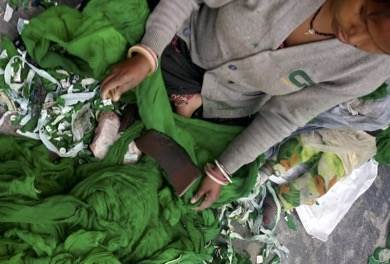Adidas, Birla and PVH move to tap Indian textile waste

Globally reaching sustainability initiative Fashion for Good, headquartered in Amsterdam, has launched a new, 15-month project, Sorting for Circularity India, alongside collaborators including adidas, PVH (the owner of brands such as Tommy Hilfiger and Calvin Klein), Arvind Limited, Birla Cellulose and Levi Strauss & Co.
Fashion for Good primarily aims to support companies throughout the fashion supply chain in working with technology providers to make clothing more sustainable.
For this project, the intention is to dig deeper to reach an understanding of both the pre-consumer and post-consumer textile waste streams in India, the organisation stated, plus pilot sorting and mapping infrastructure “solutions”.
The scheme will be split into three phases: firstly, understanding India’s textile waste supply chain; secondly, piloting technologies which can enable waste traceability and accessibility to existing recyclers; thirdly, incentivising the scaling of these technologies by supplying recyclers with textile waste feedstocks that meet advanced recycling technologies’ requirements.
Tallinn-based (and Fashion for Good Accelerator programme alumnus) Reverse Resources, which specialises in helping garment factories and textile waste recyclers trade and trace waste end-to-end, has been selected to analyse and feedback on the pre-consumer textile waste streams, as well as design and manage the pre-consumer pilot.
Managing director at Fashion for Good, Katrin Ley, commented: “India is a critical hub, not only for textile production and consumption, but also as a global post-consumer textile waste destination. This project is pivotal to understanding the size of this considerable market and providing the incentive, tools and means for the industry to benefit from the wealth of this untapped resource.”
In a statement, Ms Ley’s organisation suggested that India imports “millions” of tonnes of global post-consumer textile waste, to the value of over €100 million ($112 million).
As with domestic post-consumer waste, data on this imported waste is “limited”, Fashion for Good said. Further, this waste is problematic for mechanical textile recyclers, who require large quantities of quality, already sorted waste as their feedstock. The issue is a sizeable one, as there are currently “significant barriers” to the scaling of chemical recycling technologies - which are more tolerant of ‘contaminated’ materials, for instance - in India.
On behalf of Mumbai-based Birla Cellulose, the company’s business director designate, H.K. Agarwal, contributed: “A collaborative approach to building a reliable and robust supply chain of pre- and post-consumer waste is crucial for scaling the circular business model for the fashion industry - and for Birla Cellulose to reach our ambitious goal of scaling circular fibres such as Liva Reviva to 100,000 tonnes per year by 2024.
“This project can have a huge social impact by creating more value from waste by the collection, segregation and upscaling of textile waste and create a win-win situation for all stakeholders while making fashion more sustainable.”
The Brenninkmeijer family controlled Laudes Foundation, founded last year, supplied funding for the scheme.
Image shows the sorting of post-consumer textile waste in India. Credit: Saahas Zero Waste










